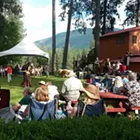Bill McDonough, keynote speaker at May's One Spokane summit, is known worldwide for his visionary ideas and his willingness to tackle issues that may seem far-flung from his architectural background. Often he's complimented by clients for his ability to "think outside the box," but his response to such comments is a classic McDonough-ian turnabout.
"What box?" he says, laughing. "Why do you think there's a box?" That deceptively simple yet thought-provoking retort is just the kind of challenge he issued to the delegates of the summit. As that cross-section of the community pondered routes to growth, he urged the assembly to consider a different perspective: "What do you want to grow? Prosperity or poverty? Intelligence or stupidity? Health or sickness?"
McDonough -- architect, community designer, sustainability guru, envisioner of abundance -- is returning to Spokane, as he promised the summit's delegates, to ask more questions and share more ideas about the future of the community. One Spokane and the mayor's office are bringing McDonough to the Spokane Opera House on Wednesday, September 4, at 6:30 pm to present strategies for regional economic development, including local renewable energy programs. The event will also provide citizens the opportunity to sign up to participate in the evolving One Spokane process. Everyone in the community is invited and encouraged to attend this free event; all those attending are asked to bring along a non-perishable food item for the Second Harvest Food Bank.
"The marvelous thing about Spokane is that it has such a deep history of its relationship to resource flows," McDonough said last week from his home in Virginia. "But now, everything has shifted. It's time to get back to the relationship with the natural world, and to start to articulate a vision for the future of the city. How do we see a world of abundance that's a world of abundance for the people of Spokane?"
Based on what he saw at the summit in May, McDonough is optimistic about Spokane's ability to reinvent itself for the next century. "I thought the One Spokane event was a tremendous success," he says. "I've been part of many events like this, and I was very impressed. I think once people suspend their sense of disbelief and of shuffling along, change will happen. That's what happens with our corporate clients; what we need is the license to practice, to explore new technologies and be creative."
The list of McDonough's corporate and government clients is impressive: Herman Miller, Nike, Ford Motor Company, the cities of Chicago and Chattanooga, Gap Inc., and Oberlin College are among the notables. In Chicago, his firm is working with Mayor Richard Daley on the mayor's goal of transforming the city into "the greenest city in America." Just last week, he was profiled in Time magazine as a key person in the nation's transition to a more sustainable future.
For Spokane, he sees possibilities in the renewable energy industries, particularly wind power. The cost of wind-generated electricity is becoming competitive, even at the small scale of current production, so he predicts growing demand for windpower facilities. These new industrial-sized windmills have unusually long blades, and somebody has to build them, he says.
"You need a big industrial plant to build these, like an empty aluminum plant. So, do that in Spokane. To run a windmill factory, we need computer experts, we need turbine designers. There's a huge list of occupations needed. We need to engage higher education. So, do that in Spokane. Why not? Wind is a growing business. Let's get into growth businesses."
On a roll now, McDonough continues. "We don't know what to do. We need to admit that, then we can sit down together and figure out what to do. The rules are it must be immensely profitable, socially just and ecologically intelligent. But we've got to get together to imagine it. My role is to help loop Spokane into the worldwide business network for your chosen business. It might be renewable energy, it might be safe food cultivation. There's all sorts of things that you could become. We need to reverse that old saying, 'Think globally, act locally.' Spokane needs to think locally, and act globally. Think of what you have locally, then act globally -- make windmills for the rest of the world."
In addition to his work with One Spokane, McDonough and his firm, William McDonough + Partners, are developing design concepts for the future science center on the north bank of the Spokane River, across from Riverfront Park.
"The science center project allows us to be present in your city," he says. "The building will act as a fulcrum for change, a place to test principles, to ask questions like how are humans meant to use science at this time."
When he first visited the north bank site, McDonough was stunned by both the dramatic beauty of the Spokane River and the city's lack of engagement with it. "It's almost embarrassing what you've done with that site," he says. "How many cities do you know with a waterfall -- a waterfall! -- right in the middle of downtown? And what have you done? There are no overlooks, no easy ways to see it. But it's an easy thing to start to imagine. Take down the handrails on the bridges, put up glass, then people will start to see the river again. The city will begin to sparkle. The river would become emblematic of the change you're undertaking."
In order to envision a new identity, Spokane must engage in some "ego-system management," McDonough contends.
"It's time to get over the inferiority complex," he says. "It's history. So Seattle has boomed while you've stood still. So what? Get over it. Now it's your turn. Go for it. Enjoy yourselves. Have fun."
"You can go fly-fishing within walking distance of downtown," he continues. "You've got such a spectacular location. What are you depressed about?"















